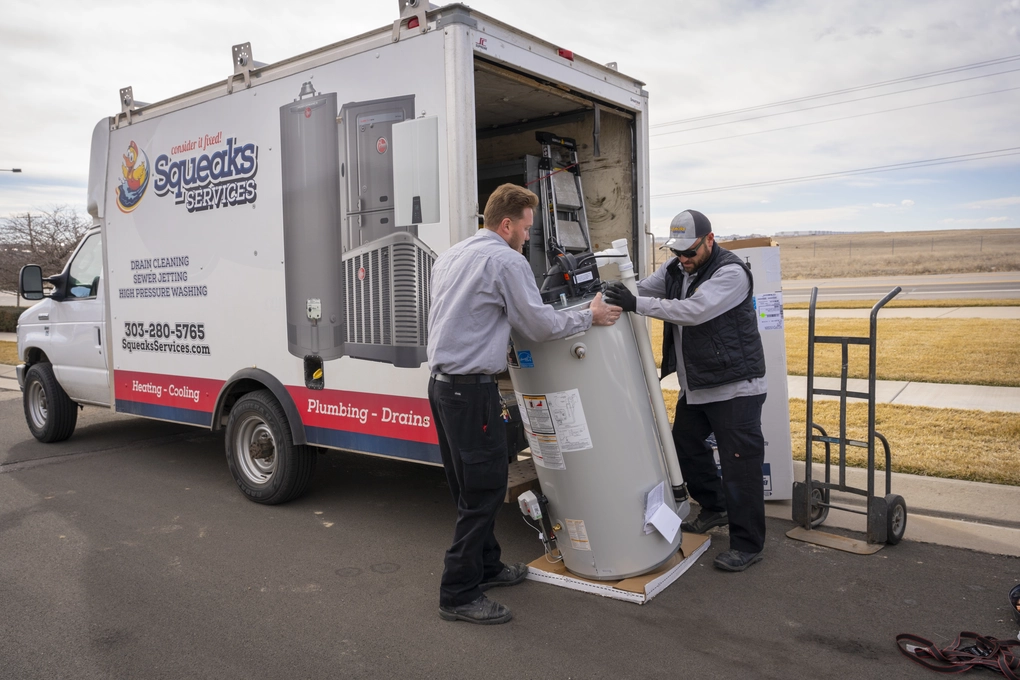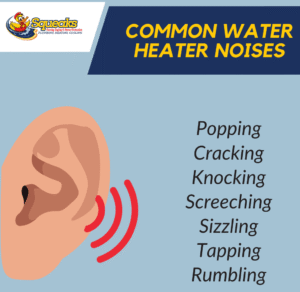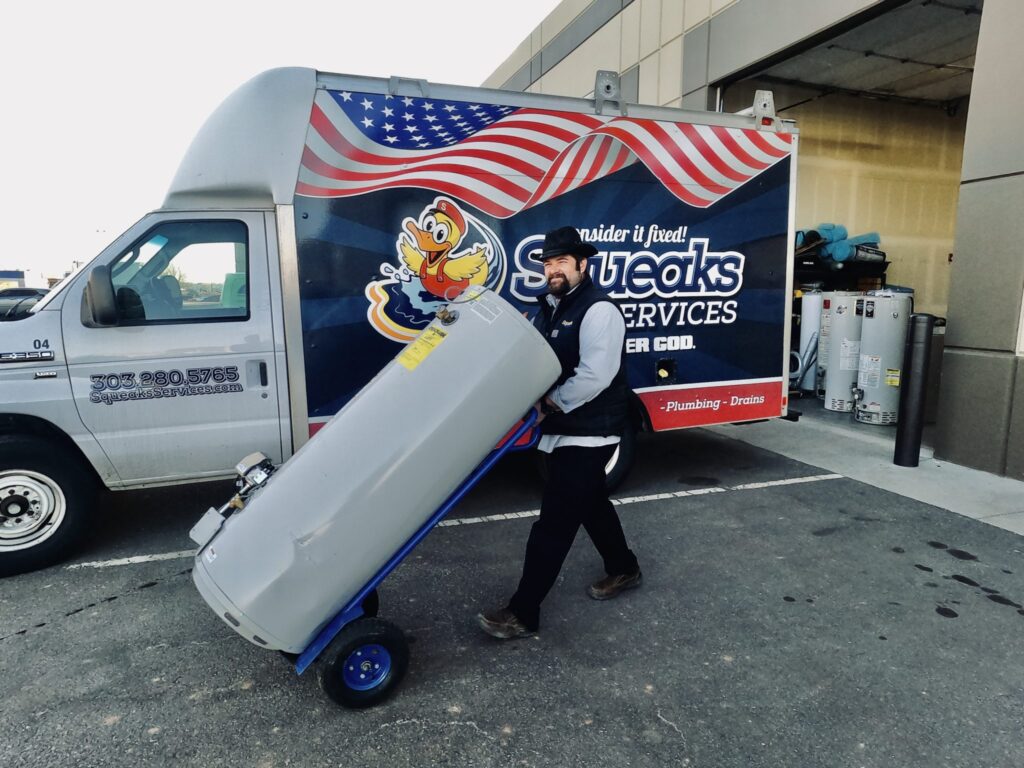
Like any major appliance, your water heater has a lifespan, and eventually, it comes time to replace it. The water heater plays an important role in the home, so recognizing early on when it needs attention can help prevent catastrophic effects.
With the average water heater failure in Denver running homeowners anywhere from $100 to $1,700 to repair, it’s often more cost-effective to repair vs. replace your water heater. This can be a significant upfront investment, but it ensures that you won’t have to deal with the stress and inconvenience of having no hot water in your home.
Find out when to replace your water heater to avoid unexpected shutdowns and hot water interruptions. Explore the most common signs you need a new water heater and. If your system is nearing the end of its lifespan, the Squeaks team provides for professional water heater replacement in Denver, CO.
Where To Start
First, it’s crucial to know what type of water heater you own. There are two types: tank and tankless water heaters, both of which function slightly differently. Even so, there are core factors to consider when trying to determine if your water heater is near due for a replacement or just a repair.
One primary factor, of course, is the age of the unit itself. The average lifespan of a water heater is eight to 15 years for tank-style units, while tankless water heaters can last up to twice as long, at 20 years or more. While tankless water heaters cost more upfront and have more in-depth maintenance requirements than tank units, they make up for it with superior energy efficiency and longer lifespan. Regardless of the type of unit you have in your home, it’s important to be aware of the common signs indicating an impending water heater shutdown.
Changes in water
Any changes you notice in the water are good signs that your water heater is not doing well. This includes rusty water, either in color or with a metallic odor, or cloudy water. If it becomes harder to keep the hot water running or even get any water to heat up in the first place, there is a fair chance your water heater is to blame.
Before going straight for emergency water heater replacement, try flushing your water tank. This is a vital maintenance task that should be done annually to limit the buildup of sediment in the tank. If the water quality is still poor after flushing, consider budgeting for the cost to replace your water heater.
New noises 
Ever hear a strange noise when turning on the hot water faucet? If so, it may be time to replace your unit or, at the very least, have it inspected by a professional. Common water heater noises include:
- Popping
- Crackling
- Screeching
- Sizzling
- Tapping
- Rumbling
More suspicious signs
Besides keeping an eye out for any changes in the water or listening for new sounds, there are a few other signs you should look out for. If your energy costs spike by 20% to 30% with no major change in usage, there’s a good chance that an issue with your water heater is causing it to consume more than its usual amount of energy.
Also, pay close attention if you suspect your water heater is leaking. This is a serious problem that puts your home at risk of severe water damage, skyrocketing water bills, and even the growth of hazardous mold in your home. If you notice any of these issues, contact your trusted plumbing professionals at Squeak’s immediately to get these concerns addressed. These are telltale signs that it’s time to replace your water heater.
Repair vs Replace Decision Tree
The best thing to do when you have immediate concerns is to speak to a plumbing expert. Both standard water heater and tankless water heater maintenance, repair, and replacement services are available with our team of leading experts serving the Denver, Colorado area.
On a more proactive basis, we recommend having your water heater regularly serviced to ensure it is running smoothly.
Understanding Water Heater Types Before Upgrading
What are your options if you need to replace your system? There are two main types of water heaters to choose from, each with its own pros and cons in terms of efficiency, cost, and installation.
What’s the difference between a tank vs. tankless water heater replacement?
Tank water heaters
Tank-style units have a finite reservoir of water, which is depleted with use and then slowly refills over time. Tank-style units are less expensive to install and simpler to maintain, but they have the major downside of occasionally running out of hot water, leading to cold showers or laundry day issues.
Tankless water heaters
Tankless water heaters heat water on demand, providing a near-infinite supply of hot water. They also tend to run more efficiently than tank-style units, reducing their operating costs. However, tankless water heaters cost more to install and have more complex maintenance requirements, which makes them a larger upfront investment.
Tankless units also have the advantage of being much smaller, meaning they’re easy to install in virtually any Denver home, whether it’s an apartment, condo, townhouse, or a full-sized family home.
What’s the right option for your home? As Squeak’s owner, Larry Benavidez, puts it, “In Colorado’s variable climate, tankless saves on heating cold groundwater.” This is especially important during the winter months, when the water supplied to your home is much colder. This cold water forces units to run harder, meaning a higher-efficiency, tankless unit saves you money compared to a conventional tank-style heater.
Here are a few other comparisons between tank and tankless water heaters:
|
Feature |
Tank Water Heater |
Tankless Water Heater |
|
Lifespan |
8-12 years |
20+ years |
|
Energy Efficiency |
0.5-0.7 EF |
0.8-0.99 EF |
|
Upfront Cost (Denver Install) |
$800-1,500 |
$2,000-4,000 |
|
Annual Savings |
Baseline |
$100-200 |
Cost Breakdown: Repair, Replace, or Upgrade?
We suggest replacing or upgrading your system using this formula: repair costs > 50% of the cost of a new unit. While repairing a system in poor condition will cost you less today, you’re ultimately putting money into an appliance that’s destined to fail again before long.
By paying more for a new system, you’ll enjoy better reliability and can also take advantage of another water heater upgrade benefit — reduced energy costs. Additionally, most new, energy-efficient systems enable Denver homeowners to qualify for energy rebates through Xcel Energy, helping to offset installation costs and make a modern unit more affordable.
If it’s time to say goodbye to your current system, you’ll also need to decide whether to replace it with the same type of water heater or make the switch to something new. Whenever possible, we recommend investing in a high-efficiency, tankless water heater. While these units are more expensive initially, their superior energy efficiency means they’ll likely pay for themselves over the year, assuming they’re properly maintained.
DIY Checks vs. When To Call a Pro
If you suspect there’s a problem with your water heater, there are a few DIY steps you can take to try to diagnose and repair the problem before calling in a professional.
- Step one: Determine if you have a gas or electric water heater.
- Step two: Check the power source of your unit. If it’s electric, check your electrical panel and confirm that the breaker for your water heater hasn’t been tripped. For gas heaters, check if the pilot light has gone out.
- Step three: Try to restore power by flipping the breaker back on or relighting the pilot light according to the manufacturer’s instructions.
- Step four: Check your water heater’s thermostat settings and ensure they’re correctly set, usually to heat water to 120ºF.
- Step five: If you’re having trouble with an electric water heater, locate the reset switch (usually behind a panel on the tank) and press it to reset the system.
- Step six: Check all around the unit, including behind and underneath it, for any visible water leaks or signs of moisture damage.
- Step seven: Flush your tank to remove sediment.
- Step eight: Check the anode rod (for tank-style units). If it’s extremely corroded and degraded, have it replaced.
Eco-Friendly Upgrades for Denver Homes
The state of Colorado has in-depth sustainability goals to help lower the environmental impact of its residents. With this in mind, many Denver homeowners are interested in making eco-friendly water heater upgrades.
One good option for improved efficiency and reduced ecological impact is a heat pump water heater (also known as a hybrid water heater), which moves heat from one place to another to warm water rather than generating heat within the unit itself. They consume far less energy than other types of units, making them a good choice for eco-conscious households.
It’s always worth choosing an energy-efficient water heater in Denver to ensure you’re buying a unit that operates at a lower cost with a reduced environmental impact.
Repair or Replace Your Water Heater With Squeak’s
The best thing to do when you have immediate concerns is to speak to a plumbing expert. Squeak’s offers both standard water heater and tankless water heater maintenance, repair, and replacement services with our team of leading experts serving the Denver, CO area. On a proactive basis, we recommend having your water heater serviced regularly to ensure it runs smoothly. Contact us today for more information!
Frequently Asked Questions
How do I know if my water heater is still under warranty?
Check the serial number on the label of your water heater (usually located on the side). Most manufacturers encode the manufacture date (e.g., “A23” = January 2023). Tank warranties typically last six to 12 years, while tankless warranties can last up to 15 years. Contact the manufacturer or Squeaks Services for verification.
What does it mean if my water heater is leaking from the bottom?
A leak from the bottom often signals a failing tank, loose drain valve, or corrosion. Small leaks may be repairable, but persistent ones usually mean replacement. Call a Denver plumber for a free inspection to assess damage.
Is it worth upgrading to a tankless water heater?
Tankless models save $100 to $200 annually on energy in Denver’s cold climate and last 20+ years. Upfront costs ($2,000 to 4,000 installed) are higher, but Xcel Energy rebates can offset them. They’re ideal for homes with high hot water demand.
Can I replace my water heater myself?
DIY replacement is risky due to gas/electrical hazards and Denver plumbing codes. Improper installation can void warranties or cause leaks. Hire a licensed plumber like Squeaks Services for safe, code-compliant work.
How much does it cost to replace a water heater in Denver?
Water heater replacement costs in Denver vary depending on the type of unit you choose, its size, and your location. Generally, you can expect to pay between $800 and $6,000 for tank-style units and $2,500 to $7,000 for tankless models.



